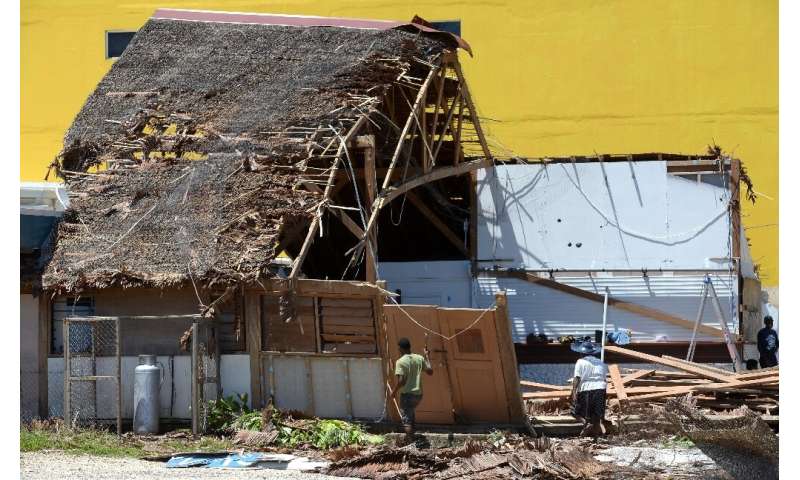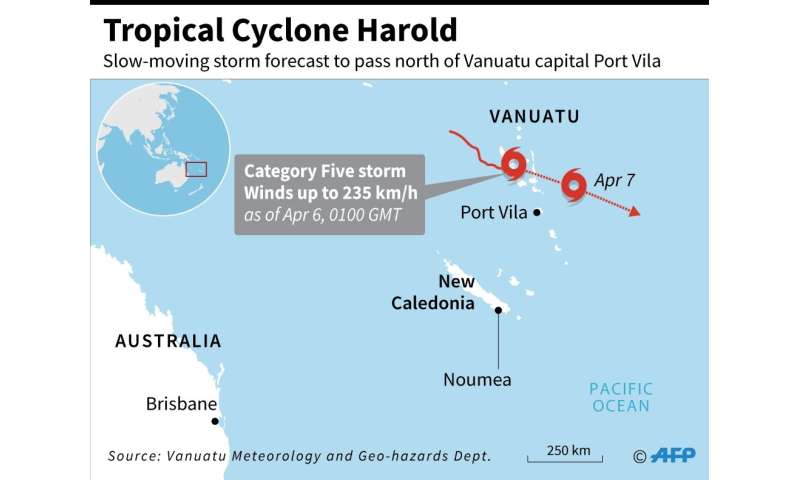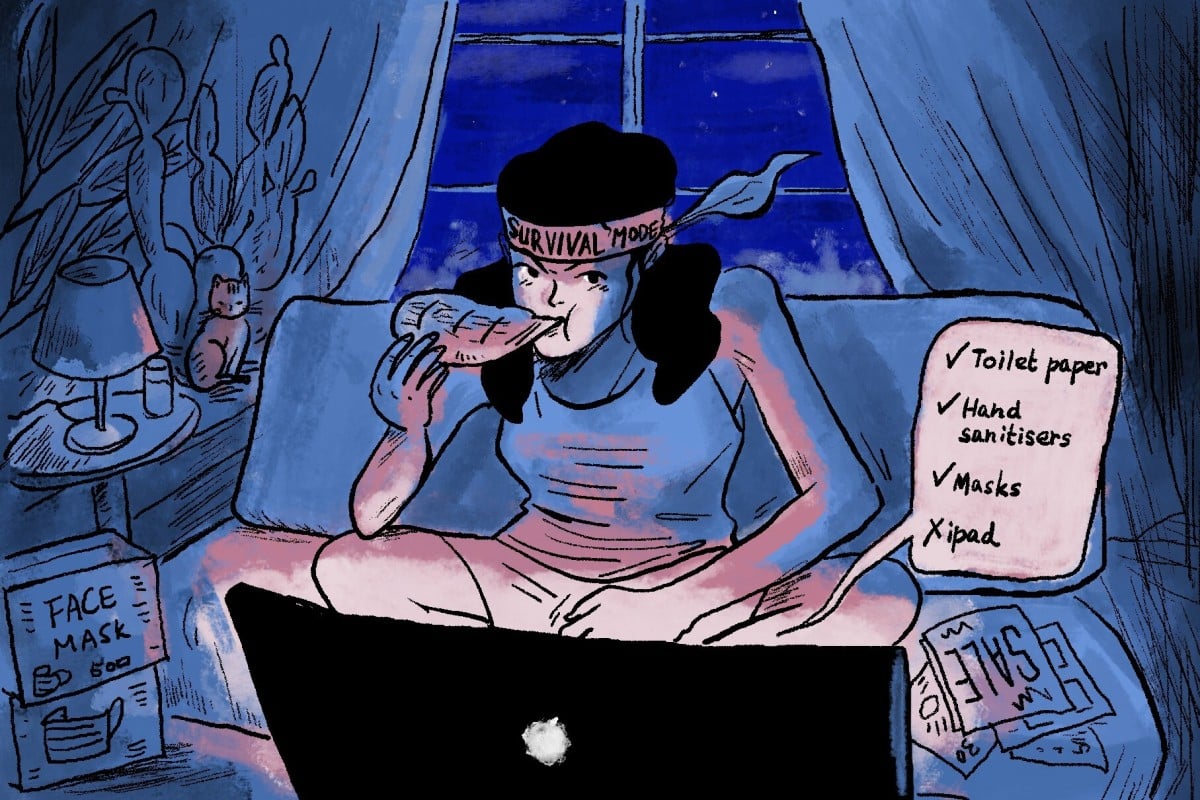Virus hope in Europe as US girds for 'Pearl Harbor' moment
 AFP / Lucas BARIOULETA French first aid worker from the Protection Civile Paris Seine holds an oxygen mask over the mouth and nose of a male patient suspected of being infected with COVID-19 a he lies in an ambulance
AFP / Lucas BARIOULETA French first aid worker from the Protection Civile Paris Seine holds an oxygen mask over the mouth and nose of a male patient suspected of being infected with COVID-19 a he lies in an ambulance
Europe's hardest-hit nations saw some tentative signs of hope in the fight against the coronavirus Monday but the United States braced for its "Pearl Harbor moment" as the country's death toll raced towards 10,000.
The virus has infected virtually every corner of the planet, confining nearly half of humanity to their homes and turning life upside down for billions on a deadly march that has claimed nearly 70,000 victims.
 AFP /COVID-19 in the US
AFP /COVID-19 in the US
Queen Elizabeth II delivered only her fourth emergency address in a 68-year reign to urge Britain and Commonwealth nations to "remain united and resolute" as Prime Minister Boris Johnson was hospitalised with the disease.
But there was cause for cheer in some European hotspots, with Italy reporting its lowest death toll in two weeks, Spanish fatalities dropping for the third straight day and France seeing its fewest dead in a week.
 AFP / ADRIAN DENNISVal Cloke sits in her living room in the village of Hartley Wintney watching Queen Elizabeth II deliver a special address to the UK and Commonwealth about the coronavirus outbreak
AFP / ADRIAN DENNISVal Cloke sits in her living room in the village of Hartley Wintney watching Queen Elizabeth II deliver a special address to the UK and Commonwealth about the coronavirus outbreak
"The curve has started its descent and the number of deaths has started to drop," said top Italian health official Silvio Brusaferro, adding the next phase could be a gradual easing of a strict month-long lockdown.
In Spain, nurse Empar Loren said: "The situation is more stable. The number of patients in intensive care is not growing much anymore, and we are starting to discharge quite a few."
 AFP / Bryan R. SmithThe United States is bracing for its "Pearl Harbour moment" as the country's death toll races towards 10,000
AFP / Bryan R. SmithThe United States is bracing for its "Pearl Harbour moment" as the country's death toll races towards 10,000
At a field hospital set up at a Madrid conference centre, staff applauded whenever a patient was healthy enough to be sent home.
Builder Eduardo Lopez, 59, gave a "10/10" rating to the staff who cared for him "with tenderness and a great dose of humanity".
- '9/11 moment' -
But while the curve was bending in Europe, there was little sign of let-up in the United States, where the death toll approached 10,000 and authorities warned worse was around the corner.
 AFP / Natalia KOLESNIKOVAA municipal worker cleans and disinfects walkways in a yard in Moscow, during the strict lockdown in Russia
AFP / Natalia KOLESNIKOVAA municipal worker cleans and disinfects walkways in a yard in Moscow, during the strict lockdown in Russia
"This is going to be the hardest and the saddest week of most Americans' lives, quite frankly," US Surgeon General Jerome Adams told Fox News.
"This is going to be our Pearl Harbor moment, our 9/11 moment, only it's not going to be localised."
The death toll in hardest-hit New York state rose to 4,159, Governor Andrew Cuomo said, up from 3,565 a day prior.
 AFP / Sergei GAPONA man stands in front of giant crosses in the town of Achmiany, some 130 km northwest of Minsk, during Palm Sunday celebrations
AFP / Sergei GAPONA man stands in front of giant crosses in the town of Achmiany, some 130 km northwest of Minsk, during Palm Sunday celebrations
It was the first time the daily toll had dropped but Cuomo said it was too early to tell whether that was a "blip."
Images from New York showed medics in protective gear wheeling bodies on stretchers to refrigerated trailers repurposed as makeshift morgues.
The city that never sleeps was quiet, the streets around Time Square deserted as neon lights continued to flicker, one reading: "2020. To those fighting for our lives. Thank you."
 AFP / Michael TeweldeOrthodox Christians pray on the street after police officers barred their way to the Medhane Alem Cathedral, as the government warned the public to avoid large gatherings to curb the spread of the COVID-19 (novel coronavirus) in Addis Ababa, Ethiopia
AFP / Michael TeweldeOrthodox Christians pray on the street after police officers barred their way to the Medhane Alem Cathedral, as the government warned the public to avoid large gatherings to curb the spread of the COVID-19 (novel coronavirus) in Addis Ababa, Ethiopia
President Donald Trump has warned of "horrific" death toll numbers and John Hopkins University said more than 1,200 people had died of coronavirus complications over the past day.
- 'Starve to death' -
In an empty Saint Peter's Square, Pope Francis, head of the world's 1.2 billion Catholics, appealed for people to show courage in the face of the pandemic.
 AFP / SANJAY KANOJIAResidents in Allahabad light candles and turn on their mobile phone torches outside their homes during a nine-minute vigil called by India's Prime Minister in a show of unity and solidarity in the fight against the coronavirus pandemic
AFP / SANJAY KANOJIAResidents in Allahabad light candles and turn on their mobile phone torches outside their homes during a nine-minute vigil called by India's Prime Minister in a show of unity and solidarity in the fight against the coronavirus pandemic
The elderly pontiff, who himself has been tested twice for the virus, celebrated his Palm Sunday mass by livestream.
Other religious leaders went to more extraordinary lengths to deliver the traditional Palm Sunday blessing, with Archbishop Jose Domingo Ulloa of Panama celebrating from a helicopter.
The effective mothballing of the global economy is beginning to hit hard with analysts warning poverty levels will spike with millions of jobs lost despite unprecedented stimulus programmes.
 AFP / Aizar RALDESMunicipal workers disinfect the streets of La Paz, Bolivia, as a preventive measure to slow the spread of the novel coronavirus, COVID-19
AFP / Aizar RALDESMunicipal workers disinfect the streets of La Paz, Bolivia, as a preventive measure to slow the spread of the novel coronavirus, COVID-19
Iran, whose economy has suffered the double blow of the virus and punishing US sanctions, said it would allow "low-risk" economic activity to resume as daily infection rates fell for a fifth straight day.
But some in poorer countries are already chafing against curfews destroying their livelihoods.
"How can anyone stay home without anything to eat?" asked Garcia Landu, a motorcycle taxi driver in Angola's bustling capital Luanda.
 AFP / DELIL SOULEIMANMembers of the Kurdish Red Crescent check passengers for COVID-19 symptoms upon their arrival at the Qamishli airport in Syria's northeastern Hasakeh province
AFP / DELIL SOULEIMANMembers of the Kurdish Red Crescent check passengers for COVID-19 symptoms upon their arrival at the Qamishli airport in Syria's northeastern Hasakeh province
"Better to die of this disease or gunshot than to starve to death," he said.
UN Secretary General Antonio Guterres urged governments to protect women from rising domestic violence.
"For many women and girls, the threat looms largest where they should be safest. In their own homes," he said.
Describing a rise in abuse as "horrifying," he said authorities should "make the prevention and redress of violence against women a key part of their national response plans for COVID-19."
Despite the gloom, heartwarming examples of humanity around the globe have lifted spirits, with ordinary people doing what they can to help those on the medical front line.
In a Barcelona restaurant, chefs flipped burgers to deliver to nurses and doctors. "When you deliver the food and you see they're happy, that makes us happy and it makes us stronger," said delivery man Daniel Valls.
And in the southern Italian city of Naples, a street artist lowered a "solidarity food basket" from his balcony, hollering "If you can, put something in. If you can't, take something out."
"We started by putting a piece of bread, a bag of pasta, a box of peeled tomatoes," said English-language tutor Teresa Cardo, who also lowered a basket.
"And two hours later, the basket was completely full."
burs-ric/
















